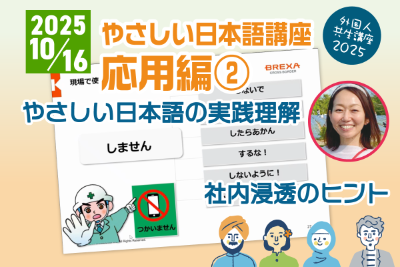- やさしい日本語
- ひらがなをつける
- Language
We provide multilingual content through machine translation. Translation accuracy is not 100%. About the multilingualization of the JAC website
- About JAC
- JAC Membership Information
- Specified Skilled Worker Acceptance
- Specified Skilled Worker Overview of the system
- 10 Mandatory Assistance for Foreigners
- Online individual consultation
- Seminar on Coexistence with Foreign Nationals
- Leading examples of host companies
- Case studies collection "Visionista"
- Foreigner's Voice
- Foreign Resident Acceptance Manual / Q&A
- Useful column "JAC Magazine"
- Acceptance support services
- Specified Skills Acceptance Support Service
- Skills improvement support
- Online Special Education
- Skill training
- Japanese Language Course
- Education and Training Support
- Subsidy system for obtaining qualifications
- Support for creating a comfortable workplace
- Temporary Return Support
- CCUS charge support
- Support system for promoting the accumulation of employment history
- Post-acceptance training
- Compensation system for Specified Skilled Worker (i)
- Daily life support
- Medical interpretation support
- Support for daily life problems
- freeJob matching
- The Specified Skills Evaluation Exam
- Home
- JAC Magazine
- Working with foreign workers
- What measures can be taken to ensure smooth communication with foreign workers?
- Home
- JAC Magazine
- Working with foreign workers
- What measures can be taken to ensure smooth communication with foreign workers?

What measures can be taken to ensure smooth communication with foreign workers?
I wrote the article!

(One company) Japan Association for Construction Human Resources
Chief of Research and Development Department / Administration Department / Public Relations Department
Motoko Kano
(Kano Motoko)

Hello, this is Kano from JAC (Japan Association for Construction Human Resources).
Many companies would like to communicate smoothly with foreign workers, but find it quite difficult.
There are some problems that can easily arise when communication is not smooth, and in some cases this can cause disruption to business operations.
In this article, we will introduce some common problems that can arise when communicating with foreign workers and measures you can take to ensure smooth communication.
Why are foreign workers in Japan on the rise?
According to the Ministry of Health, Labor and Welfare's survey on "Foreigner Employment Status," as of October 2022, there are 1,727,221 foreigners working in Japan.
This is an increase of 2,893 people from the previous year, and is the highest number since reporting of "foreign employment status" became mandatory in 2007.
The reason for the increase in foreign workers is that Japan is making a national effort to prepare a system for accepting foreigners in order to alleviate the country's labor shortage.
Another aspect is that the number of foreigners wanting to work in Japan is increasing.
More and more foreigners are considering living in Japan due to the country's high wages, good public safety, and generous employee benefits.
Many foreigners were attracted to working in Japan because of the high wages, but due to the weak yen, other countries are also becoming more likely to come up as options, and competition with other countries is increasing.
Communication problems that often occur between foreign workers and the companies that accept them
When foreign workers work in Japan, there are problems that often arise when it comes to communication and issues that foreign workers are prone to face.
We will introduce some of the most representative ones.
I can't understand the words
If foreign workers are not accustomed to communicating in Japanese, communication will become stressful for both the foreign workers themselves, who are unable to express themselves well, and for companies that are unable to understand what the foreign workers are trying to say.
Not only can an inability to communicate smoothly in Japanese cause problems at work, but it can also make foreign workers feel lonely because they don't understand the language.
In addition, depending on the industry you work in, such as construction, agriculture, or fishing, there are significant risks to safety and health, and a lack of communication can lead to life-threatening accidents.
The problem is not just the Japanese language ability of foreign workers; another issue is the inability of the host companies to speak the native language of foreign workers.
However, considering that there are foreign workers from various countries, it would be wise for the accepting company to have them aim to learn Japanese rather than trying to adapt to the language of each country.
Some solutions to improve your Japanese language skills include:
- Conduct in-house Japanese language training
- Have them attend a Japanese language school
- Create a reward system according to the level of the Japanese Language Proficiency Test
The only way to improve the Japanese language skills of foreign workers is to increase the opportunities for them to learn Japanese.
Some examples of actual initiatives being undertaken by companies include taking foreign workers to free Japanese language schools run by the government, or exchanging diaries in Japanese in order to communicate with them while also aiming to learn the language.
If it is difficult to provide training in-house, or if you want employees who can contribute immediately, you will need to take measures before they join the company, such as setting a required level of Japanese language ability as a condition for joining the company.
I can't understand the subtle nuances of Japanese
Even if you understand Japanese, it is often difficult to communicate effectively due to the ambiguous expressions unique to the language and the ability to "guess" or "read the mood," which can easily lead to misunderstandings.
Isn't this an area where misunderstandings and other problems can easily arise, even between people whose native language is Japanese?
Japanese people sometimes try to convey difficult things in a roundabout way, intending to be considerate, but this can make it difficult for foreigners to understand the conclusion, and can come across as insincere.
The solution is to avoid ambiguity and focus on communicating clearly and concisely.
This is a common point in communication between Japanese people as well, but it will be easier for others to understand if you state the conclusion first and then explain the reasons.
Differences in culture and values
Differences in cultural values and religions can lead to vastly different attitudes toward work.
For example, in Japan it is common to see people helping others with their work when they have free time, but in some countries, the idea is that "other people's work belongs to them, and helping them means taking their work away, so it's not okay to do that."
One solution is to be aware that what we consider to be normal in Japan may not be normal in other countries.
It is important to understand and respect each other's cultures and religions, rather than forcing Japanese culture and values on foreign workers as the saying goes, "When in Rome, do as the Romans do."
It is not good to force your values on others, but as a company it is necessary to be clear about the rules that you want employees to follow and to explain them carefully so that they understand.
Actual examples of initiatives include deepening cross-cultural understanding through introductions to the culture of foreign workers' home countries and foreign language classes, as well as getting to know Japanese culture through flower arranging classes and participation in traditional festivals.
Feeling lonely easily
Not understanding the Japanese language and cultural differences can make people feel lonely and unfamiliar with life in Japan.
To solve this problem, it is important to create a system that allows foreign workers to enjoy life in Japan, in addition to helping them learn the Japanese language and reconcile differences in culture and values.
Examples of corporate initiatives include participating in local festivals and other events together, installing Wi-Fi in employee dormitories so that employees can stay in touch with their home countries at any time, and creating group chats led by workers with high Japanese language skills to facilitate communication.
In "Leading examples of companies employing foreigners," we introduce many other examples of innovations and initiatives.
If you are having trouble communicating with foreign workers, be sure to check this out.
In addition, the following column explains common problems that can arise when hiring foreign workers.
Please check it out as well.
Explaining common problems that can occur when hiring foreign workers and how to deal with them! Also introducing preventive measures
How to communicate smoothly with foreign workers

In order for foreign workers and Japanese people to communicate smoothly, it is important to actively engage with them.
While it is important to improve the Japanese language skills of foreign workers, it is equally important to ensure that they feel psychologically secure while working.
It would also be a good idea to learn some simple greetings in the foreign workers' native language and use them to talk to them, as well as listen to them talk about their home countries and cultures.
If you feel that words are difficult to understand, it can be effective to use gestures and easy-to-understand illustrations.
Try to communicate proactively, whether that be by writing it down on paper or using a translation tool.
In addition to increasing opportunities for communication on a daily basis, it is also effective to give students assignments to write in Japanese about once a month.
When we say writing, it doesn't have to be difficult writing; something like a diary exchange is fine.
Not only will this help you improve your Japanese language skills, but it will also be an opportunity to learn about the thoughts and concerns of foreign workers.
If you are worried about living in Japan, this may be the key to resolving your concerns.
Companies that employ foreign workers and responded to JAC's interviews raised the following points regarding communication:
- Understand the other person's culture and build a deep relationship
- Give and take is the key to strengthening relationships
- It is important to be considerate of others' feelings.
The key to smooth communication is to think of it as "communication between people," rather than thinking "because they are Japanese" or "because they are foreigners."
Summary: Proactive communication with foreign workers is important
In recent years, the number of foreigners working in Japan has been increasing as Japan's system for accepting foreigners has been improved.
Problems that foreign workers often encounter when working include the language barrier, differences in culture and values, and the ambiguity of the Japanese language.
Additionally, many foreign workers feel lonely due to being unfamiliar with life in Japan.
In order to communicate smoothly with foreigners, it is important to actively engage with them.
Companies will need to take the initiative in providing events and opportunities for Japanese language learning, as well as deepening understanding of intercultural communication.
It is not good to impose Japanese values on others just because you are working in Japan.
It is also necessary to carefully explain in easy-to-understand language the things we want you to uphold as our company philosophy and important ways of thinking when working, so that everyone can understand.
If you are a company that is considering accepting Specified Skilled Worker in the construction industry, please feel free to contact JAC!
The author of this article

(One company) Japan Association for Construction Human Resources
Chief of Research and Development Department / Administration Department / Public Relations Department
Motoko Kano
(Kano Motoko)
Born in Aichi Prefecture.
He is in charge of public relations, research and investigation, and is the person behind social media.
We update our social media accounts daily with the desire to make people fall in love with Japan, to spread the appeal of construction from Japan to the world, and to ensure that Japan's construction industry continues to be the industry of choice around the world.
He is also engaged in research into the feasibility of implementing skills evaluation exam in Asian countries, and is conducting interviews with local organizations in each country.
Related articles

What is the Japanese level of Specified Skilled Worker? Precautions and measures after acceptance

Things to know when working with Muslim employees in a Japanese company

What is the obligation to notify the employment status of foreigners? Foreign workers who must be notified and how to apply

What is the status of residence that allows you to work? Explaining the types, how to obtain it, and more!

















